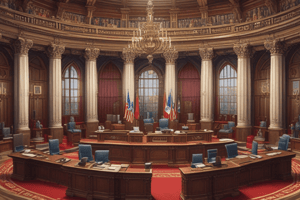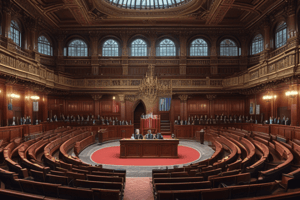Podcast
Questions and Answers
What is the term for a government that remains in power temporarily after an election has resulted in a hung parliament?
What is the term for a government that remains in power temporarily after an election has resulted in a hung parliament?
- Caretaker government (correct)
- Coalition government
- Transitional government
- Minority government
Which of the following describes a situation where the President and the Prime Minister come from different political parties?
Which of the following describes a situation where the President and the Prime Minister come from different political parties?
- Cohabitation (correct)
- Hung parliament
- Minority government
- Coalitional presidentialism
What electoral system is characterized by voters ranking candidates and a candidate needing a majority of preferences to win?
What electoral system is characterized by voters ranking candidates and a candidate needing a majority of preferences to win?
- Majoritarian system
- Plurality system
- Alternative Vote (correct)
- Proportional Representation
What is the primary feature of bicameralism compared to unicameralism?
What is the primary feature of bicameralism compared to unicameralism?
In electoral systems, what is meant by 'district magnitude'?
In electoral systems, what is meant by 'district magnitude'?
Which statement best describes Duverger's law?
Which statement best describes Duverger's law?
What mechanism is often used in electoral systems to prevent parties from gaining representation if they do not meet a certain vote threshold?
What mechanism is often used in electoral systems to prevent parties from gaining representation if they do not meet a certain vote threshold?
Which coalition type refers to a coalition that consists of only the minimum number of parties needed to achieve a majority?
Which coalition type refers to a coalition that consists of only the minimum number of parties needed to achieve a majority?
Flashcards
Vote of no confidence
Vote of no confidence
A vote of confidence is a mechanism in parliamentary systems where the legislature expresses its support for the government. If the government fails to secure a majority vote, it is considered to have lost the confidence of the parliament and must resign.
Coalition government
Coalition government
A coalition government is formed when two or more political parties join forces to create a majority in the legislature and form a government. They often agree on a common program and distribute ministerial positions.
Caretaker government
Caretaker government
A caretaker government is a temporary government that is formed to manage the affairs of a country until a new government can be elected after the previous government resigns or is dissolved. It typically does not introduce significant new policies.
Hung Parliament
Hung Parliament
Signup and view all the flashcards
Duverger's law
Duverger's law
Signup and view all the flashcards
Electoral System
Electoral System
Signup and view all the flashcards
Proportional Representation (PR)
Proportional Representation (PR)
Signup and view all the flashcards
Mixed Electoral System
Mixed Electoral System
Signup and view all the flashcards
Study Notes
Concepts
- Formateur: A key figure in parliamentary systems, responsible for putting together a government coalition.
- Cabinet: The group of ministers in a government.
- Government (in Parliamentary and Semi-Presidential Systems): The executive branch, formed and functioning differently in these systems.
- Portfolio: The area of responsibility assigned to a minister in government.
- Vote of no confidence: Mechanism to remove a government in parliamentary systems.
- Caretaker government: Interim leadership during a transition period. Often between governments.
- Hung Parliament: A parliament where no single party holds a majority, and forming a government is difficult.
- Coalition (and types of coalitions): Agreements between different political groups to form a governing body. Includes specific types.
- Coalitional Presidentialism: A system where coalitions are integral to presidential governance.
- Minimum Winning Coalition: Coalition with the smallest number of parties needed to hold power.
- Unicameralism vs. Bicameralism: Systems with one or two legislative houses, and their respective advantages and disadvantages.
- "One-person, one vote": The principle of equal representation in elections.
- Presidential systems: Systems with a president who is both head of state and head of government.
- Parliamentary systems: Systems where the executive branch is responsible to the legislative body.
- Semi-Presidential/Mixed systems: Hybrid systems blending presidential and parliamentary features.
- Electoral System: Rules for translating votes into seats in a legislative assembly.
- Electoral formula: Specific math and methodology used to determine seat allocation.
- District magnitude: The number of seats in a district and how this determines electoral strategy.
- Plurality: A voting system where the candidate with the most votes wins.
- Majoritarian systems: Voting systems designed to produce a decisive majority of votes for one candidate.
- Alternative Vote: A voting system where voters rank candidates.
- Two-round system for presidential elections: Two elections to determine a winner.
- Proportional Representation systems: A process where the percentage of votes received directly translates into the percentage of seats held.
- Mixed systems (when referring to electoral systems): Combining different types of systems.
- Veto Actors: Individuals or groups with the ability to block government actions.
- Divisors (D’hondt, Sainte Lague, Modified Sainte Lague): Different methods used for calculating seat distributions in proportional representation systems.
- Quotas (for allocating seats): Guidelines for distributing seats.
- Thresholds (for allocating seats): Minimum vote requirements for parties to enter the legislature.
- Types of electoral lists: Different structures of lists presented by parties for elections.
- Head of State: The person officially representing the country.
- Head of Government: The person leading the government.
- Duverger's law & strategic/ tactical voting vs. sincere voting: A principle linking electoral systems and political party structures. Strategic involves vote choice to achieve desired results. Sincere represents honest voting preferences.
- Internally-generated parties: Parties formed organically within a particular society.
- Externally generated parties: Parties created from outside influences.
- Mass parties: Large-scale political organizations focusing on broad appeal.
- Catch-all parties: Broader parties aiming for vast appeal.
- Post-materialist parties: Parties prioritizing factors beyond basic material needs.
- Cleavages: Social divisions that influence political alignments.
- Extreme Right parties: Parties with extreme stances on political ideologies.
- Median-Voter Theorem: The tendency of political candidates to moderate their stances to appeal to the political center.
Issues
- Identifying and categorizing political parties ideologically (left and right).
- Coalition government formation strategies.
- Different vote-counting methods to assign election seats.
Studying That Suits You
Use AI to generate personalized quizzes and flashcards to suit your learning preferences.
Related Documents
Description
Test your knowledge on key concepts related to parliamentary systems, including the roles of ministers, types of coalitions, and mechanisms like the vote of no confidence. This quiz covers essential terms such as caretaker government and hung parliament that shape how governments function. Enhance your understanding of political structures in this engaging quiz.




